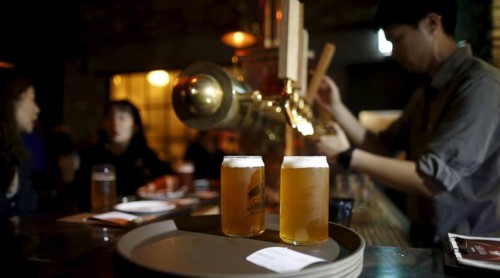Beer imports surged 43 per cent last year in South Korea, as consumers, among the most enthusiastic beer drinkers in Asia, move beyond often-bland local lagers.
South Korean beer drinkers are drinking to the more robust flavours of imported brands, encouraged in part by attractive discounts for multi-packs – so much so that local brewers are crying foul over pricing tactics and have asked for government help.
 Beer imports surged 43 per cent last year in South Korea, as consumers, among the most enthusiastic beer drinkers in Asia, move beyond often-bland local lagers. Lighter domestic beers may be well-suited to accompany traditional spicy food but Korean drinkers increasingly crave variety.
Beer imports surged 43 per cent last year in South Korea, as consumers, among the most enthusiastic beer drinkers in Asia, move beyond often-bland local lagers. Lighter domestic beers may be well-suited to accompany traditional spicy food but Korean drinkers increasingly crave variety.
The jump in imports has seen the two main local brewers – Anheuser-Busch InBev SA’s Oriental Brewery and Hite Jinro – go from commanding 99 percent of the market in 2012 to sliding to 82 percent in the first half of last year – a swift encroachment that is expected to take further ground.
“Foreign beer has boosted its share of the household retail market rapidly and I expect the same trend will emerge as they find favour in bars and restaurants over time,” said Park Sang-jun, an analyst at Kiwoom Securities Co Ltd.
Asahi Group Holdings Ltd and Kirin Holdings Co Ltd have led the invasion – aided by a weak yen, with Japanese products alone accounting for more than a quarter of imports.
European and US brands, helped by free trade agreements in 2011 and 2012, account for about half of imports led by the likes of Heineken. Chinese labels have also made inroads with E-mart, the country’s biggest hypermarket chain noting that Tsingtao’s flagship brew is now its top-selling beer.
The drastic increase for foreign beer is no trivial matter in a country known for consuming the most alcohol per person in the Asia-Pacific region. Beer accounted for 42 percent of the country’s 9.1 trillion won ($8 billion) alcohol market in 2014, government data shows.
But South Korean brewers, including new domestic entrant Lotte Chilsung Beverages Co Ltd, are keen to stem the tide – rolling out new products with higher malt content, expanding exports and making their case to authorities that local laws hamstring their ability to compete.
Where imported brands have no restrictions on discounts or promotions, local brewers cannot by law discount below factory prices.
“Domestic brands have suffered from reverse discrimination as imported beers have more flexibility in their pricing,” said Lee Eun-a, deputy general manager at Oriental Brewery.
South Korea’s Fair Trade Commission said last month it is conducting a review of competition in the beer industry- a statement that analysts view as heralding fewer discounting restrictions for local players.
An Asahi spokesman said that while the company does offer discounts, changing tastes have been the primary force driving the success of imported beer in South Korea.
Yu GoEun, a 24-year-old student in Seoul, who often joins friends for a pint of Hoegaarden, a Belgian wheat beer made by Anheuser-Busch InBev, seems to agree.
“I don’t drink domestic beer for the taste, only when I want to get drunk cheaply,” she said.

